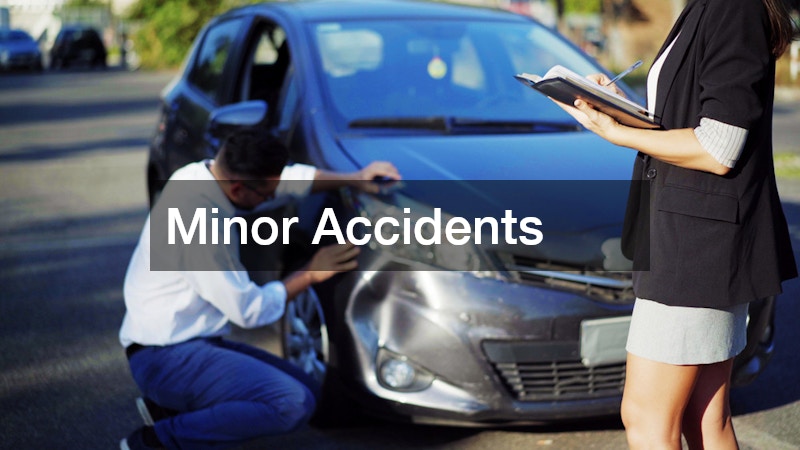- Not all minor accidents require legal representation, but hidden injuries and insurance complications can make early consultation valuable.
- Documentation—photographs, police reports, medical records—is critical even in seemingly minor crashes.
- A personal injury lawyer can negotiate better settlements, especially when fault is disputed or coverage is inadequate.
- Free case evaluations help you weigh if hiring legal help makes sense.
- Handling a simple claim yourself may save fees—but beware of undervaluing injuries or accepting inadequate offers.
- Asking the right questions to an attorney helps evaluate their experience, fee structure, and potential value.

Introduction: Is a Minor Crash Really that Minor?
Often, terms like “minor car accident” conjure images of fenders barely dented, no serious injuries, and a quick exchange of information between drivers. But appearances can be deceiving. Soft tissue injuries, concussion symptoms, or insurance delays frequently emerge days—or even weeks—after the collision. In some cases, consulting a qualified lawyer early can prevent long-term complications and financial losses. This article walks you through how to recognize when legal help makes sense—even for minor accidents—and how to protect your rights effectively.
1. What Defines a “Minor” Car Accident?
Minor accidents typically involve:
- Low-speed impacts (parking lots, slow rear-ends)
- Slight vehicle damage (no frame or structural issues)
- Minimal or no immediate pain or trauma
- Quick resolution between drivers or via insurance claims
Although the visible damage may be minimal, soft tissue injuries—like whiplash—can go unnoticed at the scene. Insurance adjusters and medical providers may undervalue these claims if not properly documented. So, don’t dismiss medical evaluation or documentation even if everything seems normal.
2. When You Might Skip a Lawyer
In some scenarios, handling a claim alone is straightforward and reasonable. If:
- Fault is clear and agreed upon
- No injuries or prompt medical evaluation confirms full recovery
- Repair costs are low and fall below your deductible
- Settlement offers are fair and promptly paid
- You feel comfortable communicating with the insurer
Then acting independently may be efficient. Many insurers handle issues swiftly when liability is clear and documentation is thorough. Still, proceed with caution—initial offers may undervalue hidden injuries or pain and suffering.
3. Situations Where Legal Help Is Smart

Even when a car accident seems minor at first, several factors can quickly complicate your ability to recover fair compensation. What initially feels like a simple fender bender may develop into a drawn-out legal or financial headache. Below are specific situations where hiring a personal injury lawyer is not just smart—but often necessary to protect your rights and your wallet.
Delayed or Hidden Injuries: One of the most common issues following a minor accident is the delayed onset of injury symptoms. Conditions like whiplash, soft tissue damage, concussions, or back pain may not appear immediately at the scene. You may feel fine initially, only to wake up with severe stiffness, headaches, or nerve pain days later. Without proper documentation and legal help, insurers may argue that these issues are unrelated to the accident. A lawyer can ensure your symptoms are properly tied to the incident and included in any settlement discussions.
Insurance Denial or Delay: Insurance companies are known to minimize payouts whenever possible. Even if fault is clear and injuries are documented, they may deny the claim outright or delay the process, hoping the claimant will give up or accept a lower offer out of frustration. Legal representation helps push back against these tactics and ensures that all necessary evidence and deadlines are met. An attorney can also escalate the case if the insurer violates state regulations or acts in bad faith.
At-Fault Driver Is Uninsured or Underinsured: When the driver who caused the accident doesn’t have enough coverage—or any insurance at all—it becomes difficult to recover the full cost of your damages. In these cases, your own uninsured/underinsured motorist (UM/UIM) coverage may apply, but dealing with your own insurance company can be just as challenging. A lawyer can help identify all possible sources of compensation and build a strong case using your policy’s language and coverage limits.
Disputed Fault: Even in minor accidents, fault isn’t always black and white. The other party—or their insurer—may attempt to shift blame to you. This is especially common in rear-end collisions or parking lot accidents where liability can be ambiguous. In these cases, proving fault becomes critical to securing a fair settlement. Legal help is invaluable for gathering witness statements, analyzing police reports, or hiring an accident reconstruction expert if needed.
Low Initial Settlement Offers: It’s not uncommon for insurers to make a quick, lowball settlement offer shortly after the accident. These offers are often presented before you’ve had a chance to assess the full extent of your injuries or property damage. Accepting an offer too soon may mean forfeiting your right to further compensation later. An attorney can review the offer, calculate what your case is really worth, and negotiate a better outcome on your behalf.
Underestimated Property Damage: Not all vehicle damage is visible to the naked eye. Structural issues, damaged suspension, or alignment problems can become apparent only after a full mechanical inspection. If you’ve already accepted a settlement based on visible damage alone, you may be left covering the additional repairs out-of-pocket. A lawyer can help ensure that all potential repairs and evaluations are completed before you agree to anything.
Signs You Should Consult an Attorney
Even if you’re unsure whether legal help is necessary, certain red flags indicate you should at least schedule a free consultation:
- Persistent pain requiring ongoing medical care: Extended treatment or follow-ups suggest your injuries are more than just temporary discomfort.
- Difficulty working or loss of income: If the accident has impacted your ability to earn a living, this must be factored into your claim.
- Disagreement over liability: Disputes about who caused the accident can affect your ability to recover damages—especially in shared-fault states.
- Feeling rushed to accept a low settlement: Insurance companies may pressure you into a fast agreement before the full extent of your situation is known.
- Insufficient damage assessment or dispute with adjusters: If the adjuster undervalues your claim or seems dismissive, legal support can help level the playing field.
In these situations, reaching out to a personal injury law firm with good reviews can provide clarity, peace of mind, and professional guidance. Many offer free case evaluations and work on contingency, meaning there’s no risk in finding out if your case warrants representation. Acting quickly ensures evidence is preserved and your rights remain protected.
4. The Pros and Cons of Doing It Yourself
Pros
- You avoid legal fees or costs.
- You may receive faster settlement if the case is uncomplicated.
- You retain full control over negotiations.
Cons
- Risk of accepting an unfair settlement.
- Potential for insurance companies to misinterpret or undervalue injuries.
- Lack of legal guidance if complications arise.
- Missing medical or financial impacts you weren’t aware of initially.
5. How a Lawyer Can Help Even in Small Cases
A knowledgeable attorney can provide:
- A free consultation to evaluate your potential case.
- Negotiation with adjusters, often leading to significantly higher settlements.
- Experience spotting long-term costs, such as rehabilitation or lost future earnings.
- Support through possible underinsured motorist claims or medical liens.
- A no-win, no-fee agreement, minimizing financial risk.
Real-life outcomes: settlements sometimes exceed initial offers by two to three times—especially after medical needs develop or liability is unclear.
6. Protect Yourself Right After an Accident
These steps help preserve your claim—even when injuries or damage seem minor:
- Always call the police, even for small collisions.
- Take photographs of vehicle damage, the accident scene, and your injuries.
- Seek medical attention promptly, ideally within 24–48 hours.
- Never admit fault, verbally or in writing.
- Report the accident to your insurer—but stick to facts.
- Keep a journal of recovery: pain, missed work, medical visits, and emotional effects.
7. Key Questions to Ask a Lawyer
During a consultation, consider asking:
- Is there any cost just to evaluate the case?
- Have you handled cases similar to mine?
- How do you charge—hourly, contingency, or flat fee?
- What’s my case potentially worth?
- Are there any deadlines (like the statute of limitations)?
- Are you certified or recognized by peer organizations?
A good lawyer should explain your options clearly—and help you decide whether legal representation is necessary.
8. Real-Life Examples Where Legal Input Helped
- Delayed Whiplash Diagnosis: A client initially declined medical care. Two weeks later, pain intensified. Settlement after legal assistance covered therapy, time off work, and vehicle repair.
- Insurance Initial Denial: Despite soft-tissue injury, insurer initially refused benefits. Post-counseling, claim was accepted, and settlement exceeded medical costs.
- Disputed Fault Case: In a parking lot accident, the other driver blamed you. With legal guidance, liability was clarified, and you weren’t held responsible.
9. Costs and Outcomes: What to Expect
Most personal injury attorneys work on a contingency basis—typically 25–40% of the final settlement, but no payment if you don’t win. Be sure to ask about:
- Whether this percentage includes expenses (filing fees, expert witnesses, mediation costs).
- How long settlement processes usually take.
- What level of involvement you will have in the case.
If your expected compensation is minimal and repair costs are straightforward, paying fees could exceed benefits. In more complicated scenarios, even a small investment in legal guidance can yield a better outcome.
10. Final Thoughts: When to Go It Alone—or When to Hire Help
- Minor accidents with clear liability and no medical costs may not require lawyers—provided you document thoroughly and settle carefully.
- However, hidden injuries or disputes warrant legal advice to avoid shortchanging your claim.
- A quick consultation with a trustworthy firm can clarify your rights and help you make informed choices—without obligation.
Remember, the goal is not to escalate every minor incident—but to protect your health, finances, and legal rights when the accident isn’t as minor as it initially appears.




